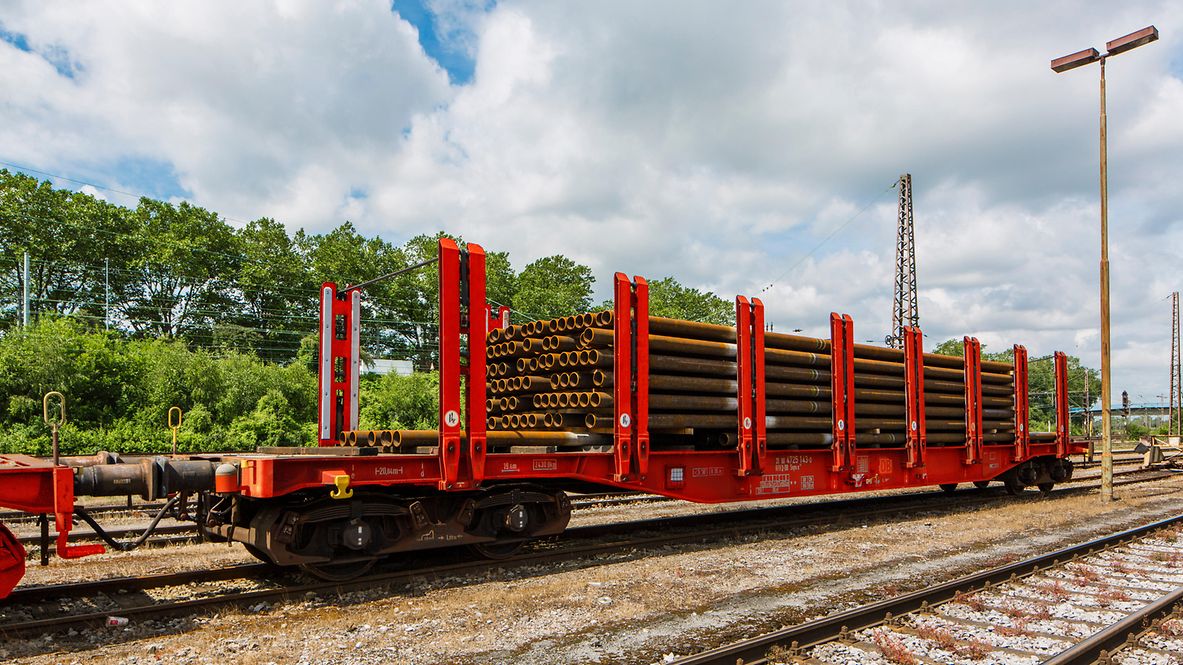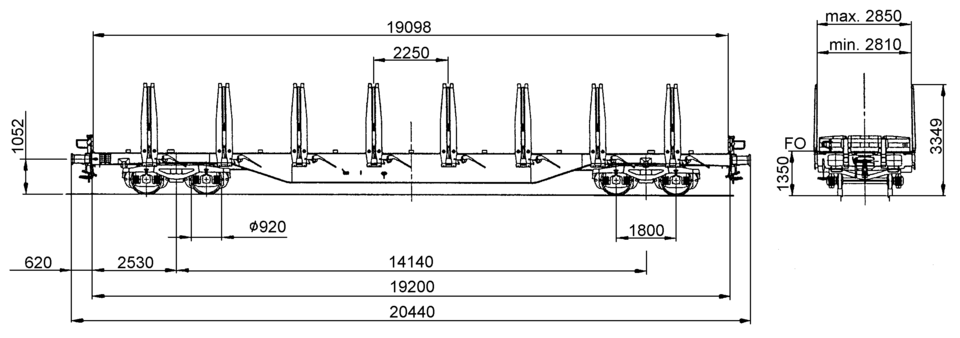Article: Sns 727
Bogie flat wagon with four wheelsets, drop ends and indirect fastening equipment.The bogie flat wagon has been specially developed for transporting pipes, sectional steel and steel flat bar products, and is characterised by its high load capacity and optimised securing of the load.
Note: Type is similar to the wagon in the photo. For exact dimensions, please refer to the drawing and the data below.
Technical details
Loading length (mm) | 19,098 |
Loading width (mm) | Max. 2,850 |
Loading area (m2) | 54.4 |
Average tare weight (kg) | 26,500 |
Maximum speed (km/h) | 120 |
Smallest radius of curvature (m) | 75 |
First year of delivery or year of construction of the oldest wagons at this time | 2001 |
Parking brake | Without parking brake |
Brake type | KE-GP-A |
Number of brake cylinders (pcs.) | 1 |
Brake cylinder diameter (mm) | 406 |
Type of load-proportional braking | Automatic, 1 WM 10 load-proportional valve |
Buffer type | Keystone with TecsPak 40 kJ and hardened buffer head- End force (kN): 740- Stroke (mm): 105 |
Buffer head dimensions (mm) | 450 x 340 |
Automatic coupler | Prepared |
Distributor valve type | KE 2dSL-ALB/d 8 |
Individual data
Stanchion height (mm) | 2,000 |
Load limits
Average tare weight 26.50 t
Without parking brake
A | B | C | D | |
|---|---|---|---|---|
S | 37.5 t | 45.5 t | 53.5 t | 63.5 t |
120 | 00.0 t | 00.0 t | 00.0 t | 00.0 t |
DB | CM |
|---|---|
100 t | 57.5 t |
Concentrated loads
m | Spread over the support length | On two baseplates | |
|---|---|---|---|
a-a | 2.25 | 33.0 | 33.0 |
b-b | 6.75 | 48.0 | 48.0 |
c-c | 11.25 | 63.5 | 59.0 |
d-d | 14.14 | 63.5 | 63.5 |
Additional information:
The wagon is preferably used for transporting pipes. There are bolsters on the wagon floor and stanchions on the long sides of the wagon to hold and support the cargo. Hand-operated indirect fastening equipment is provided to tie down the cargo.
Wooden bolsters are provided in the stanchion area and above the bogie pins for supporting the load. The bolsters are high enough to allow the use of standard handling equipment. The bolsters are made of hardwood on the outside with a softwood core, which can be nailed, in the middle. Fixed 5 mm lower auxiliary bolsters are positioned 1 m from the drop ends and between the stanchions.
The wagon floor is completely covered with a walk-on grating. The covers are not suitable for carrying loads or for driving on with industrial trucks.
Each head end is fitted with a drop end that can be folded outwards to secure the load, which is itself secured by two short stanchions that can be lowered. The wagons can run with the drop ends folded down and the stanchions lowered.
To secure the load, there are eight fixed stanchions on each long side of the wagon at of 2,250 mm intervals. The stanchions are inclined 20 mm towards the centre of the vehicle when unloaded. They are firmly connected to the underframe side solebar and are designed in such a way that they can safely absorb the forces generated by the cargo along the length and the width of the wagon. The connection can be loosened for maintenance (stanchions may only be attached and removed in workshops). The inner sides of the stanchions are lined with a protective strip of laminated wood to protect the cargo.
Each stanchion pair comes with indirect fastening equipment to tie down the cargo; this equipment can be operated by one person. The lashing straps are coated with an elastic material to protect the cargo. The length of the strap is designed so that cargo can also be tied down in the G2 profile. The lowest tie-down height is approx. 850 mm at the middle four stanchion pairs.

